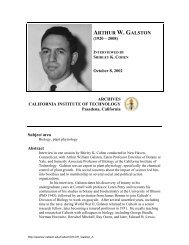Interview with David Baltimore - Caltech Oral Histories
Interview with David Baltimore - Caltech Oral Histories
Interview with David Baltimore - Caltech Oral Histories
You also want an ePaper? Increase the reach of your titles
YUMPU automatically turns print PDFs into web optimized ePapers that Google loves.
<strong>Baltimore</strong>-4<br />
LIPPINCOTT: Oh! That was around in those days<br />
BALTIMORE: Oh, yes. Well, this was the school in exile for the great German philosophers and<br />
psychologists; and her interest was in child psychology—experimental psychology, really. And<br />
so she took classes from the greats of psychology of the day. She knew Wolfgang Köhler, who<br />
was old by then—he was a founder of Gestalt psychology. Hans Wallach, Solomon Asch—these<br />
were the greatest of people, and they had all been given intellectual homes on the East Coast,<br />
either at The New School or at Swarthmore College. Wallach and Asch were both at<br />
Swarthmore—I took classes from Asch when I was at Swarthmore. That’s one of the reasons I<br />
went there—there were multiple reasons, but that’s certainly one of them. My mother got a<br />
master’s degree at that time in experimental psychology. She did everything for her PhD but<br />
write her thesis, and I’ve never known why she didn’t. She had a block in writing. Not that she<br />
didn’t write well—she wrote perfectly well—but she didn’t seem to want to write things up. She<br />
was not aggressive in pursuing her own position in academic psychology.<br />
LIPPINCOTT: She wasn’t interested in practicing<br />
BALTIMORE: Oh, no, this was not about practicing. This was all experimental psychology. She<br />
was interested in the nature of perception—that was the big question for the Gestalt<br />
psychologists—and in other theoretical questions. She worked <strong>with</strong> animals some, but a lot <strong>with</strong><br />
children, and developed, apparently, very sophisticated thinking about childhood development. I<br />
can’t tell you very much about it. But she had a mentor, Mary Henley, who was sort of the last<br />
of the Gestalt psychologists.<br />
LIPPINCOTT: Did she want an academic career<br />
BALTIMORE: Yes, so she had one. She taught at The New School, once she had finished her<br />
training, for quite a number of years [1958-1966] and also at Sarah Lawrence [1965-1977],<br />
where she got tenure at age sixty-two.<br />
LIPPINCOTT: Gee! There’s hope for us all!

















